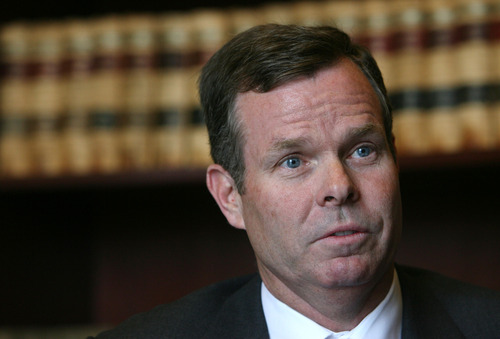This is an archived article that was published on sltrib.com in 2013, and information in the article may be outdated. It is provided only for personal research purposes and may not be reprinted.
Lawyers representing Utah Attorney General John Swallow argue in a newly released document that a complaint seeking his removal from office over alleged campaign-finance violations "lacks sufficient merit to be worthy of serious consideration" and should be dismissed.
Swallow's attorneys, Rod Snow and Jennifer James, argue in the filing with the Lieutenant Governor's Office that the allegations against the Republican attorney general are motivated by the media and politics and seek a remedy — Swallow's ouster from office — that is not allowed under the law.
"We believe no further investigation is needed," Snow writes in the filing, obtained Friday by The Salt Lake Tribune through an open-records request.
The liberal-leaning Alliance for a Better UTAH filed the 12-count complaint last month, alleging that Swallow made repeated omissions from his campaign financial-disclosure statement, including concealing his interest in a company at the center of a scandal involving indicted St. George businessman Jeremy Johnson.
Swallow failed to report his ownership in P-Solutions, a company Swallow has said was paid $23,500 by the late Richard Rawle for consulting work Swallow did on a Nevada cement project.
Rawle, who founded the Provo-based payday-loan chain Check City, paid P-Solutions for that work with money Rawle received from Johnson for what Swallow has characterized as a lobbying deal — Johnson has referred to it as a bribe — that Swallow helped arrange, intended to help Johnson's I Works company avoid a lawsuit by the Federal Trade Commission alleging deceptive business practices.
Swallow later returned the money to Rawle and asked to be paid from another account.
But Swallow did not list his interest in P-Solutions or several other companies he and his wife owned on his original financial disclosure. He later removed his name as an owner of those companies in corporate records and filed an amended disclosure the same day, but still failed to list his wife's interest.
Swallow's attorneys contend that he was not obligated to disclose the companies because they were put into a blind trust for his children as beneficiaries, so Swallow never benefited from payments to the companies.
Even if Swallow were required to disclose his interest in the companies, the remedy under the law, his attorneys argue, should be to ask him to file an amended financial disclosure, not remove him from office.
"This is the case," Snow writes, "even when the financial-disclosure error involves a candidate for elective office and is made just prior to an election and could have made a difference in the election."
The filing says the trust was created in 2009. However, it is not mentioned in the corporate ownership of any of the companies in question. The disclosure forms state that candidates should list businesses in which they have an ownership interest, whether or not they received income as a result.
Snow also notes that Alliance for a Better UTAH attorneys were sloppy in their filing, referring in two of the 12 counts in their complaint to business interests held by an entirely different John Swallow.
"[Swallow's disclosures] were filed in good faith, were true and accurate to the best of his understanding and belief, and were adequate under the requirements of the financial disclosure statutes," Snow writes.
Mark Thomas, administrator of the Lieutenant Governor's Office, said it will likely take a few weeks to review the complaint and response and decide how to proceed.
In the last days of the legislative session, lawmakers realized there was a conflict in state law, which would have required the Attorney General's Office to investigate the complaint against the attorney general.
Lawmakers rushed through a bill giving the lieutenant governor the authority to appoint a special counsel to investigate complaints against the attorney general if the complaint is deemed to have merit.
Thomas said the office could decide to appoint a special counsel, dismiss all or part of the complaint, or, if further expertise is needed, hire an outside attorney to provide a legal opinion on whether to appoint a special counsel.
Alliance for a Better UTAH said Friday the Lieutenant Governor's Office should move immediately to appoint a special counsel to investigate the complaint and not waste time and money seeking an outside legal opinion.
The decision to seek another legal opinion "is absurd, reeks of cronyism, is a waste of taxpayer resources and seems to thwart the legislative intent of Utah's election laws," the group said in a statement.
Appointing the special counsel "is the only way to assure the citizens of Utah that Mr. Swallow's actions, and Utah's election laws, are being fully and properly investigated."



